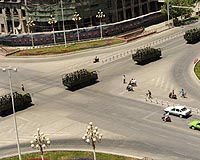| . |  |
. |
Kandahar, Afghanistan (AFP) June 20, 2010 It is a phrase often used by American commanders: "Kandahar city is not burning." In the hub of southern Afghanistan, birthplace and stronghold for the Taliban, US-led NATO forces are using a gentle approach, training police and attempting to restore the authority of a government accused of absenteeism. "No one really fights us in the city. The problem is, there is no governance. Militias, gangs, criminal groups govern the city. The solution is going to be a government solution," said a US military official in Kandahar. Thousands of extra troops are surging into the Kandahar as part of a mammoth build up designed to drive the Taliban out of the province in a critical campaign to end nine years of war in Afghanistan. While there will likely be some tough battles against insurgents in surrounding districts, international forces swear Kandahar will not be another Fallujah, the rebel city ravaged at the height of the war in Iraq. Shops are in full swing in the maze of dusty lanes of Kandahar's city centre, but anxiety among residents is still palpable. Taliban militants do not control the city of 800,000 people, assure NATO officials, yet they are a looming threat that feeds the sense of impunity in a city plagued by crime and corruption. Threatening letters and late night phone calls warning against cooperation with the government and foreign forces are routine, and there has been a recent wave of assassinations of local figures. On Tuesday, the governor of the neighbouring district of Arghandab was killed right in the city by a suicide bomber. Residents complain about the lack of state authority, and some even miss the brutal 1996 to 2001 Taliban regime, which at least instilled order. "Every day we hear explosions, suicide attacks... And it's getting worse every day," said Gulalai Shirzai, a woman lecturer at Kandahar University. Brigadier General Ben Hodges, head of US forces in southern Afghanistan, said people in Kandahar do not trust the government. "The only government they see is a policeman who is perhpas taking money from them. Water is not being managed properly, land disputes are not being resolved," he said. Now US forces are engaged in counter-insurgency tactics honed in Iraq, hoping to bring security to Kandahar so that working state institutions can be properly built. "You'll see two very visible things that are beginning to happen already. One is a security ring around the city. There will be at least 13 different security stations on the ring," Hodges said. "The second thing will be a significant increase of the US military police inside the city. It will increase professionalism of the (Afghan) police and will cut down on corruption." US military police will triple this summer to boost efforts in Kandahar. NATO also says the Afghan police have already made significant progress, and that recruitment is going well. But in Kandahar, their ranks are still scattered: between 800 to 1,000 Afghan police are supposed to instil order for about 800,000 inhabitatns. Their trainers also admit Afghan security forces have a long way to go before they will be effective and autonomous. "(The Afghan National Police) are not at a level where we can give them a mission and let them do it," said Michael Crowley, a sergeant in the 293rd Military Police battalion. NATO also hopes to boost the credibility of the local government by financing electricity, water, education and other projects aimed at improving people's lives. Ben Roswell, a Canadian diplomat heading the provincial reconstruction team, said civilian projects are "backed up by hundreds of millions of US dollars per year". But he admitted this influx of money "comes with risks, corruption is certainly one of them" as politicians and contractors working with NATO are strongly suspected of embezzling at the expense of Kandahar's population. Among them is Ahmed Wali Karzai, head of the provincial council and half brother of the Afghan president, accused of being a strongman involved in drug trafficking. And most acknowledge with its complex mix of security and governance, the operation in Kandahar city promises to be a long-term effort. "You've got to be realistic over how to measure success. It's not going to happen overnight," said a US military official.
Share This Article With Planet Earth
Related Links News From Across The Stans
 China plans Xinjiang crackdown for riot anniversary
China plans Xinjiang crackdown for riot anniversaryBeijing (AFP) June 18, 2010 Police in the capital of China's restive Xinjiang will launch a security clampdown ahead of the anniversary of ethnic riots, the government said Friday, in an indication they fear further unrest. Authorities in the city of Urumqi, which exploded in deadly riots last July 5, will "increase the police presence in key places, vital sectors and public areas," the Xinjiang region's state-run Tian ... read more |
|
| The content herein, unless otherwise known to be public domain, are Copyright 1995-2010 - SpaceDaily. AFP and UPI Wire Stories are copyright Agence France-Presse and United Press International. ESA Portal Reports are copyright European Space Agency. All NASA sourced material is public domain. Additional copyrights may apply in whole or part to other bona fide parties. Advertising does not imply endorsement,agreement or approval of any opinions, statements or information provided by SpaceDaily on any Web page published or hosted by SpaceDaily. Privacy Statement |